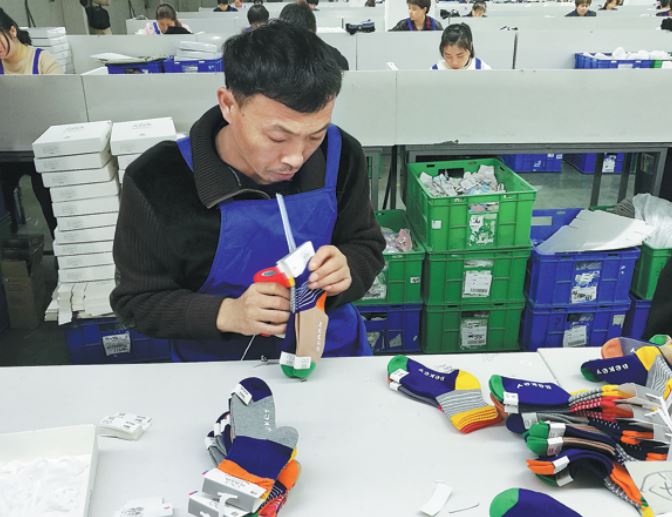Private firms with good prospects get a helping hand


Commercial banks in Zhejiang province are taking innovative measures to help private companies with good prospects get through hard times, by exploring an interbank consultation mechanism under the guidance of local banking and insurance regulators.
More than five years ago, Zhejiang Mengna Socks & Hosiery Co Ltd provided a debt guarantee of 260 million yuan ($38.4 million) for Zhejiang Weihai Zipper Co Ltd, a former leading zipper manufacturer in China, under a mutual guarantee that aimed to help each participant receive bank loans without collateral.
Weihai Zipper went bankrupt in 2013, as its forceful business expansion into real estate development and deep involvement in mutual debt guarantee programs eventually led to capital chain rupture.
The financial risk soon spread to Mengna, and a few joint-stock commercial banks reduced the amount of loans issued to the company or recovered loans before their maturity date.
To find out how serious the risk was, the local government and banking and insurance regulators conducted a comprehensive evaluation of Mengna's business and financing situations. They concluded that the company had been focused on the manufacturing and selling of socks for a long time and had basically complied with financial norms. It ran into temporary trouble mainly because it was involved in a chain of debt guarantees.
The regulators did not find overinvestment or misappropriation of credit funds by the company, although it had invested in the housing market and a regional commercial bank headquartered in Yiwu.
"I cut off previous investments in sectors that are irrelevant to our core business," said Zong Guyin, founder and chairman of Mengna. "A big lesson I learned from the economic slowdown is that entrepreneurs like me must stay away from businesses that are not our areas of expertise."
Based on the evaluation results, local regulatory authorities decided to put Mengna on a list of companies that banks should support through difficult times using an interbank consultation mechanism, to prevent risk spreading further to Mengna's guarantors.
The local government made arrangements for the socks manufacturer to repay 52 million yuan to creditor banks for Weihai Zipper's guaranteed loans. More importantly, 15 creditor banks held a joint meeting under the guidance of the China Banking and Insurance Regulatory Commission's office in Jinhua on March 28, reaching an agreement that each bank will maintain its current amount of loans for Mengna.
In addition, three large State-owned commercial banks agreed to offer loans to the company at the benchmark interest rate over the same loan period. Joint-stock national commercial banks that are creditors of Mengna also pledged to set their lending rate cap at 20 percent higher than the benchmark rate, and local commercial banks 30 percent.
Chen Zhongqing, general manager of the risk management department at the Agricultural Bank of China's Yiwu branch, said: "Our bank will suffer a loss if we withdraw our loan to Mengna at the present stage. However, if we continue to help the company, there is a chance for us to save the loan from turning into bad debt, as we are supporting the real economy at the same time."
Chen said when making decisions on which companies to help, risk officers at the Agricultural Bank of China care most about whether or not a company is focused on its core business.
"We don't help companies that have liquidity risk because of reckless investments," he said.
Thanks to combined efforts of the local government, regulators, banks and the company itself during the last five years, Mengna's debts have dropped from 3 billion yuan to 1.51 billion yuan. The amount of debt guarantees it provided also declined from 1.6 billion yuan to 196 million yuan.
Now the company is trying to upgrade its socks manufacturing business to smart manufacturing to reduce labor costs.
"Five years ago, we could hire a worker with a monthly salary of 3,000 yuan, but now we have difficulty hiring a worker for 6,000 yuan. Due to a shortage of hands, nearly 20 percent of our production equipment is not running ... So I plan to build unmanned intelligent factories," said Zong.
Local banking and insurance regulators are encouraging banks to provide financing for the company, which plans to invest 500 million yuan within five years to build smart production lines.
"One of the reasons why banks are reluctant to offer loans to private enterprises is the business and financial data these companies provided are not reliable. It can be changed. I will connect our socks manufacturing equipment to a wireless network so that banks will have access to the data on our production and sales in real time," Zong said.
"Once we do this, I believe that banks will be willing to lend to our company and will also lower their lending rates to us," he added.




































